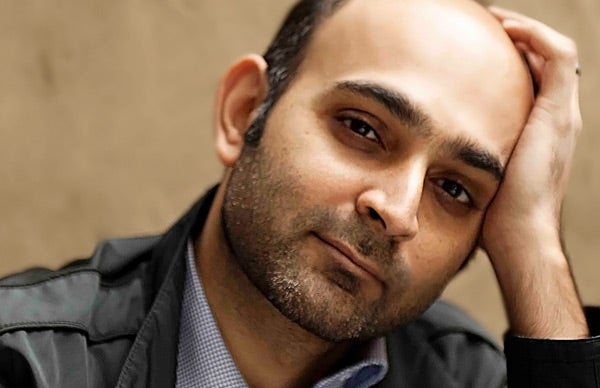Marjane Satrapi
Academy Award-nominated director, cartoonist, and author of Persepolis
-
About Marjane Satrapi
Marjane Satrapi is an Academy Award-nominated director, cartoonist, and author of the bestselling graphic memoir Persepolis. Now over a decade since it’s original publication, Persepolis is still praised and widely read; it was a New York Times Notable Book, a TIME Magazine “Best Comix of the Year,” and has sold over two million copies worldwide. In wise and meaningful talks, Satrapi speaks to audiences of all ages about her upbringing in a war-torn Iran, the struggle of feeling estranged from one’s homeland, and the importance of telling complex human stories in literature and film.
In the critically acclaimed Persepolis, Marjane Satrapi uses comic strips to tell her story of growing up in Iran against the backdrop of the Islamic Revolution and a war with Iraq. This one-of-a-kind memoir is at once a touching coming-of-age story and a reminder of the human cost of war and political repression. Since its publication, Persepolis has stirred up controversy for its political viewpoints and is often cited as an impactful “banned book,” with The American Library Association including it on a list of Top 10 Most Challenged Books of 2014. Satrapi’s other literary achievements include Persepolis 2, which chronicles Satrapi’s return to Iran after the Revolution; Chicken with Plums; Embroideries; and several other books for children.
In addition to writing books, Marjane Satrapi is also a talented film director. Most prominently, she directed the animated film adaptation of Persepolis, which won the Cannes Jury Prize and was nominated for an Oscar in 2008. She has directed and written other moving films such as Chicken with Plums, The Voices, and most recently, Radioactive, a biopic of scientist Marie Curie, which was produced by Amazon Prime Video and stars Rosamund Pike.
Contact us for more information about booking Marjane Satrapi for your next event.
-
Speaking Topics
Persepolis: The Story of a Childhood
Growing up in Iran during the Islamic Revolution had a profound impact on author and director Marjane Satrapi. Her incredibly successful graphic novel Persepolis is a chronicle of Satrapi's young life in Iran and a powerful coming-of-age story set against a war-torn country's oppressive regime. In her immersive talks, Satrapi discusses her upbringing, what it was like to witness war and persecution up close, and putting to paper her relationship with her beloved yet politically turbulent homeland. She also talks about the process of adapting the memoir into an Academy Award-winning animated film, and what it was like to translate her experiences from page to screen.
Creating Art that Makes a Difference
Marjane Satrapi is multitalented—in addition to being an author, she is also an accomplished cartoonist and Oscar-nominated director. Satrapi shows audiences the power of using different formats to tell moving stories. She helps writers, filmmakers, and artists of all kinds to find their voices and create effective, poignant art with a meaningful message. She coaches audiences through the often daunting artistic process and encourages artists to let their creativity shine through in any medium.
-
Video
-
Praise for Marjane Satrapi
Marjane’s visit was everything I’d hoped it could be and more. Marjane was amazing, compelling, funny, challenging, and charming all at once.
— Saint Mary’s College of CaliforniaPraise for Chicken with Plums
It’s amazing to see how much complexity and narrative cunning Satrapi crams into her images... Chicken with Plums is the most intricately laminated of her tales: The author shuffles past, present, and future like a cardsharp.
— Los Angeles Times Book ReviewBeguiling... Completely seamless.
— The Boston GlobeSatrapi pushes the boundaries of her work further still... [She is] an Iranian Colette.
— San Francisco ChronicleInspired.
— ElleSatrapi’s deceptively simple, remarkably powerful drawings match the precise but flexible prose she employs in adapting to her multiple roles as educator, folklorist, and grand-niece.
— The New YorkerPraise for The Complete Persepolis
A memoir of growing up as a girl in revolutionary Iran, Persepolis provides a unique glimpse into a nearly unknown and unreachable way of life…That Satrapi chose to tell her remarkable story as a gorgeous comic book makes it totally unique and indispensable.
— TIMEPraise for Embroideries
Tantalizing... Bold, bewitchingly humorous and politically astute... A cheeky and knowing peek at the loves, sexual histories and marital secrets of...these beautiful and seductive women.
— ElleEndearing... A wicked read.
— Los Angeles TimesHumorous and bawdy... An amusing portrayal of independent women taking life in stride.
— The Village VoiceEmbroideries is as funny, opinionated, controversial and surprising as any good comic or conversation should be.
— Time.comSubversive... Satrapi’s book is a mocking rebuke to the cult of chastity, and a statement about the way human passions find their way around the most determined repression.
— SalonBy turns bawdy and heartbreaking... Of all Satrapi’s books, Embroideries most effectively tears down the divide between Iranian and American culture, showing how women everywhere are similar.
— The Capital Times (Madison)Praise for Persepolis 2
Wildly charming . . . Like a letter from a friend, in this case a wonderful friend: honest, strong-willed, funny, tender, impulsive, and self-aware.
— Luc Sante, The New York Times Book ReviewThe most original coming-of-age story from the Middle East yet.
— PeopleElegant, simple panels tell this story of growth, loneliness, and homecoming with poignant charm and wit.
— The Washington PostHumorous and heartbreaking . . . A welcome look beind the headlines and into the heart and mind of one very wise, wicked, and winning young woman.
— ElleScary, moving, and etched out with a simplicity that speaks volumes. The artist is less a talent than a force.
— The Austin ChronicleIrresistible . . . Satrapi’s story is too important—and too fascinating—to let go of.
— Fort Worth Star-TelegramPowerful . . . A great, engaging tale . . . As deeply satisfying as a good, old-fashioned prose novel and as visually delightful as old picture books from childhood.
— Cleveland Plain DealerEvery revolution needs a chronicler like Satrapi.
— San Francisco ChronicleIt is our good fortune that Satrapi has never stopped visiting Iran in her mind.
— NewsweekPersepolis 2 is much more than the chronicle of a young woman’s struggle into adulthood; it’s a brilliant, painful, rendering of the contrast between East and West, between the repression of wartime Iran and the social, political, and sexual freedoms of 1980’s Austria. There’s something universal about Satrapi’s search for self-definition, but her experiences in Vienna and Tehran are rendered with such witty particularity, and such heartbreaking honesty, that by the end of this book you’ll feel you’ve gained an intimate friend.
— Julie Orringer, author of How To Breathe UnderwaterMarjane Satrapi’s books are a revelation. They’re funny, they’re sad, they’re hugely readable. Most importantly, they remind you that the media sometimes tell you the facts but rarely tell you the truth. In one afternoon Persepolis will teach you more about Iran, about being an outsider, about being human, than you could learn from a thousand hours of television documentaries and newspaper articles. And you will remember it for a very long time.
— Mark Haddon, author of The Curious Incident of the Dog in the Night-TimePraise for Persepolis
“Delectable. . . Dances with drama and insouciant wit.” –
— The New York Times Book ReviewA stunning graphic memoir hailed as a wholly original achievement in the form. There’s still a startling freshness to the book. It won’t age. In inky shadows and simple, expressive lines— reminiscent of Ludwig Bemelmans’s “Madeline”—Satrapi evokes herself and her schoolmates coming of age in a world of protests and disappearances . . . A stark, shocking impact.
— Parul Sehgal, “The 50 Best Memoirs of the Past 50 Years,” The New York TimesA dazzlingly singular achievement. . . . Striking a perfect balance between the fantasies and neighborhood conspiracies of childhood and the mounting lunacy of Khomeini’s reign, she’s like the Persian love child of Spiegelman and Lynda Barry.
— SalonA brilliant and unusual graphic memoir. . . . [Told] in a guileless voice . . . accompanied by a series of black-and-white drawings that dramatically illustrate how a repressive regime deforms ordinary lives.
— VogueOdds are, you’ll be too busy being entertained to realize how much you’ve learned until you turn the last page.
— Elle.com[A] self-portrait of the artist as a young girl, rendered in graceful black-and-white comics that apply a childlike sensibility to the bleak lowlights of recent Iranian history. . . . [Her] style is powerful; it persuasively communicates confusion and horror through the eyes of a precocious preteen.
— Village VoiceThis is an excellent comic book, that deserves a place with Joe Sacco and even Art Spiegelman. In her bold black and white panels, Satrapi eloquently reasserts the moral bankruptcy of all political dogma and religious conformity; how it bullies, how it murders, and how it may always be ridiculed by individual rebellions of the spirit and the intellect.
— Zadie Smith, author of The Autograph Man and White TeethYou’ve never seen anything like Persepolis—the intimacy of a memoir, the irresistability of a comic book, and the political depth of a the conflict between fundamentalism and democracy. Marjane Satrapi may have given us a new genre.
— Gloria SteinemI grew up reading the Mexican comics of Gabriel Vargas, graduated to the political teachings of Rius, fell under the spell of Linda Barry, Art Spiegelman, and now I am a fan of Marjane Satrapi. Her stories thrummed in my heart for days. Persepolis is part history book, part Scheherazade, astonishing as only true stories can be. I learned much about the history of Iran, but more importantly, it gave me hope for humanity in these unkind times.
— Sandra Cisneros, author of The House on Mango Street and CarameloI thought [Persepolis] was a superb piece of work, not only for the child’s eye view—the developing child’s eye view—of a society unknown to many of us in the west, and feared and suspected in proportion to being unknown…. Satrapi has found a way of depicting human beings that is both simple and immediately comprehensible, AND is almost infinitely flexible. Anyone who’s tried to draw a simplified version of a human face knows how immensely difficult it is not only to give the faces a range of expression, but also to maintain identities from one frame to the next. It’s an enormous technical accomplishment.
— Philip Pullman, author of The Golden Compass, The Subtle Knife, and The Amber SpyglassI cannot praise enough Marjane Satrapi’s moving account of growing up as a spirited young girl in revolutionary and war-time Iran. Persepolis is disarming and often humorous but ultimately it is shattering.
— Joe Sacco, author of Palestine and Safe Area GorazdeThis witty, moving and illuminating book demonstrates graphically why the future of Iran lies with neither the clerics nor the American Empire.
— Tariq Ali, author of The Clash of Fundamentalisms: Crusades, Jihads and ModernityI found the work immensely moving with depths of nuance and wisdom that one might never expect to find in a comic book. It’s a powerful, mysterious, enchanting story that manages to reflect a great swath of Iranian contemporary history within the sensitive, intimate tale of a young girl’s coming-of-age. I didn’t want it to end!
— Diana Abu-Jaber, author of Crescent and Arabian JazzA rare and chilling memoir that offers every reader a personal, honest portrait of Iran’s recent political and cultural history. Ms. Satrapi’s provocative, graphic narrative of life in Iran before and after the Islamic revolution is an extraordinary testament to the level of human suffering experienced by Iranians tossed from one political hypocrisy to another. Aside from the humanistic dimension, the beautifully minimalist Persepolis gives further evidence of Marjane Satrapi’s sensitivity and superb skill as an artist.
— Shirin Neshat, visual artist/filmmakerReaders who have always wanted to look beyond political headlines and CNN’s cliches should plunge into this unique illustrated story. Let Marji be your trusted companion, follow her into the warmth of a Persian home and out along Tehran’s turbulent streets during those heady days of revolution. Persepolis opens a rare door to understanding of events that still haunt America, while shining a bright light on the personal humanity and humor so much alive in Iranian families today.
— Terence Ward, author of Searching for HassanBlending the historical with the personal is not an easy task, to blend the individual with the universal is even more challenging. But Marjane Satrapi has succeeded brilliantly. This graphic novel is a reminder of the human spirit that fights oppression and death, it is a witness to something true and lasting which is more affective than hundreds of news broadcasts.
— Hanan al-Shaykh, author of Women of Sand and Myrhh -
Books by Marjane Satrapi
-
Media About Marjane Satrapi
Request Fees
and Availability
- 212 572-2013
- Marjane Satrapi travels from Paris, France





















